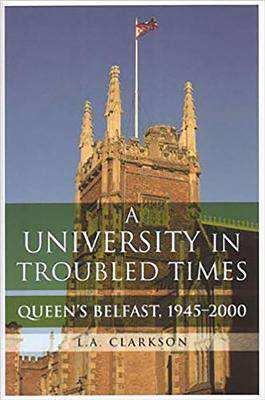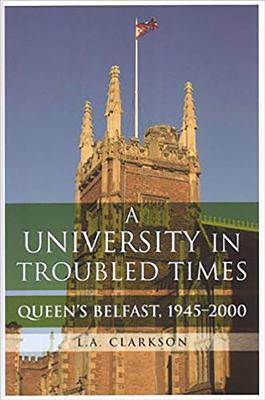
Bedankt voor het vertrouwen het afgelopen jaar! Om jou te bedanken bieden we GRATIS verzending (in België) aan op alles gedurende de hele maand januari.
- Afhalen na 1 uur in een winkel met voorraad
- In januari gratis thuislevering in België
- Ruim aanbod met 7 miljoen producten
Bedankt voor het vertrouwen het afgelopen jaar! Om jou te bedanken bieden we GRATIS verzending (in België) aan op alles gedurende de hele maand januari.
- Afhalen na 1 uur in een winkel met voorraad
- In januari gratis thuislevering in België
- Ruim aanbod met 7 miljoen producten
Zoeken
€ 110,45
+ 220 punten
Omschrijving
Queen's, Belfast, grew out of the Queen's University in Ireland founded in 1845. It became independent in 1908-9 and until 1965 it was the only university in Northern Ireland. Queen's occupies a special place in Ulster society; being looked upon by many people as much a bulwark of Ulster as Stormont, the Presbyterian Church, and the shipyard. This special place is a strength but it has also created problems, especially during the decades of the 'Troubles'. For more than thirty years, Queen's operated in a community torn by civil conflict, trying simultaneously to maintain its academic commitments to the international world of scholarship and at the same time endeavouring to adjust to a society undergoing profound economic, social and political changes. This book traces the growth of Queen's during the second half of the 20th century, from a small university of 2000 students to one approaching 20,000. It examines its academic strengths and weaknesses and how it has been affected by changes in policy in Stormont and Westminster towards universities. A unifying theme is how Queen's has responded to the changes in Northern Ireland as a whole.
Specificaties
Betrokkenen
- Auteur(s):
- Uitgeverij:
Inhoud
- Aantal bladzijden:
- 226
- Taal:
- Engels
Eigenschappen
- Productcode (EAN):
- 9781851828623
- Verschijningsdatum:
- 21/09/2004
- Uitvoering:
- Hardcover
- Formaat:
- Genaaid
- Afmetingen:
- 155 mm x 236 mm
- Gewicht:
- 612 g

Alleen bij Standaard Boekhandel
+ 220 punten op je klantenkaart van Standaard Boekhandel
Beoordelingen
We publiceren alleen reviews die voldoen aan de voorwaarden voor reviews. Bekijk onze voorwaarden voor reviews.









